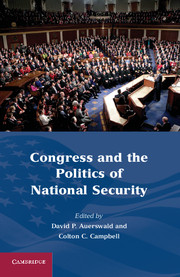Book contents
- Frontmatter
- Contents
- Figures and Tables
- Contributors
- Part One Historical and Institutional Challenges
- 1 Congress and National Security
- 2 Congress and U.S. Foreign Policy before 9/11
- 3 Institutional Challenges Confronting Congress after 9/11: Partisan Polarization and Effective Oversight
- Part Two Oversight Challenges
- Part Three Policy Challenges: Contours of Debate
- Works Cited
- Index
- References
1 - Congress and National Security
from Part One - Historical and Institutional Challenges
Published online by Cambridge University Press: 05 June 2012
- Frontmatter
- Contents
- Figures and Tables
- Contributors
- Part One Historical and Institutional Challenges
- 1 Congress and National Security
- 2 Congress and U.S. Foreign Policy before 9/11
- 3 Institutional Challenges Confronting Congress after 9/11: Partisan Polarization and Effective Oversight
- Part Two Oversight Challenges
- Part Three Policy Challenges: Contours of Debate
- Works Cited
- Index
- References
Summary
Over the last decade, a growing number of scholars and practitioners have called for a reexamination of our national security system, with much attention devoted to interagency reform (Davidson 2009, Smith 2009, Project on National Security Reform 2008). The structures and processes set in place more than a half-century ago by the National Security Act of 1947, they argue, are outdated, designed to meet the security challenges of the Cold War era instead of those of the 21st century. This can have potentially sobering outcomes, as the Project on National Security Reform noted in its 2008 study. Accordingly, the U.S. government is unable to “integrate adequately the military and nonmilitary dimensions of a complex war on terror” or to “integrate properly the external and homeland dimensions of post-9/11 national security strategy” (Project on National Security Reform 2008, ii).
Any major reform of the nation’s national security system will require congressional action. Indeed, Congress has a constitutional responsibility to weigh issues of national security concerns. Congress has the authority to raise an army and a navy, to regulate the armed forces, and to declare war. It must authorize new federal policies and determine the scope of agency actions and portfolios. It is Congress that must appropriate the money for the federal government. In addition, Congress may influence military strategy directly by legislating war aims or military regulations, or indirectly by altering the end-strength and weapons systems of the different services. If no major reform can occur without congressional action, the obvious question is whether Congress is willing and/or able to execute such a major national security undertaking.
- Type
- Chapter
- Information
- Congress and the Politics of National Security , pp. 3 - 17Publisher: Cambridge University PressPrint publication year: 2011



